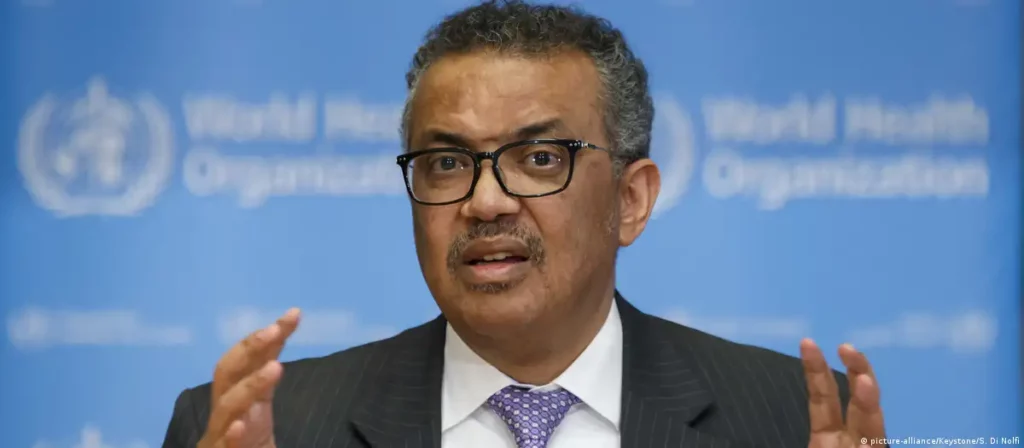Dar es Salaam. Health stakeholders pointed out that climate change has a direct impact on health, service provision, and nutrition, so urgent efforts are needed to deal with these problems.
This emerged at the health side event at the level of health ministers from member countries of the World Health Organization (WHO) at the 28th Conference of Member States of the United Nations Convention on Climate Change (UNFCCC-COP28) in Dubai, United Arab Emirates, on December 6, 2023.
Tanzania Health Minister Ummy Mwalimu addresses the meeting, saying that climate change has caused an increase in epidemics and deaths, especially in sub-Saharan countries.
Mentioning some of the diseases, Ummy said,”… diseases such as diarrhea, malaria, dengue, and non-prioritized diseases such as tuberculosis, chikungunya virus, schistosomiasis, elephantiasis, and airborne diseases. These diseases are expected to surge due to the increase in temperature and heavy rains, which result in droughts or floods.”.
Regarding water safety, the minister said that only 88 percent of urban residents have access to clean and safe water, while in rural areas it is 77 percent. Meanwhile, people with toilets of any kind account for 98 percent.
“In addition, floods have led to the destruction of water sources and the existing infrastructure, causing shortages and disease outbreaks,” said Minister Ummy.
For his part, the Director General of the WHO, Dr Tedros Ghebreyesus, said that country leaders are aware of the impacts of climate change and emphasized the importance of community involvement in dealing with the challenges of disasters in their areas.
He concluded that “climate change is a health crisis”.

On her part, World Health Organization (WHO) Regional Director for Africa, Dr Matshidiso Moeti, said, “In Africa, climate-linked health emergencies are rising. Over 50 percent of the public health events over the past decade were climate-related.”.
She then noted that by 2030, the number of people displaced due to climate change per year is expected to rise to 15 million from 7.4 million in 2019.
Nutrition and climate change
Nutrition Officer and researcher from the Tanzania Food and Nutrition Centre (TFNC), Walbert Mgeni, says there is a direct relationship between drought and nutrition because the availability of many foods depends on water.
He gave an example of how currently the country is lacking food due to the little rains last rainy season: “I am sure if you diagnose many people, you will find them with thinness, which is caused by the lack of vitamin A and insufficient food.”.
Mgeni says the drought is giving less green leafy vegetables and fruits, which are the main sources of vitamin A, but also a lack of fodder for animals.
When this problem persists over time, it causes other types of malnutrition in children, such as stunting and low weight. Connecting climate change to nutrition, Mgeni said it has greatly affected agriculture and food systems in some areas, thus affecting people’s diets.
He mentioned that the most affected areas are the central regions of the country, although the situation is currently spreading to other regions.
“People who used to grow and eat bananas or rice only now have to change and grow cassava, millet, and other drought-resistant crops; many of them fail, and that’s when the problem starts,” he said.
Mgeni advised people to focus on the balanced diet food groups, which are grains, roots, and bananas; another group is of animal origin; then vegetables and fruits; and the last group is oil, sugar, and honey, where this group is advised to be used in small amounts.
Environmentalist Dr Philip Osano pointed out that studies show that there is very little possibility of increasing productivity in agriculture, as the assessment shows a decrease in yields in five out of six important crops until 2025.
Speaking at a meeting organized by the Media for Environment, Science, Health, and Agriculture in Kenya (MESHA), Osano said climate change is causing concern for food security and trade because “maize yields will decrease by 27 percent, rice by 8.1 percent, beans by 7.2 percent, sugarcane by 58.5 percent, coffee by 23 to 45 percent, and wheat alone is expected to increase the yield by 13.9 percent.
Way forward
Minister Ummy Mwalimu said that the government is making deliberate efforts to prepare a strategic plan and guidelines to deal with these disasters in the health sector.
She then adds, “The Ministry has prepared an information system that can predict the possibility of simultaneous disease outbreaks. The Ministry is looking for funds to implement various interventions to deal with climate change in cooperation with international organizations.”.
Nutrition officer Walbert Mgeni advised people to change the types of farming and breeding by planting crops that are resistant to drought, fruits like papayas, and grains such as sorghum, and to keep small animals like chickens, rabbits, and ducks that are easy to care for.
Dr Osano mentioned five areas to be worked on, which are energy, housing and settlement, agriculture, transportation, and waste management systems, as pillars to deal with the effects of climate change on the health sector.
He added that “there is serious air pollution and threats, so we need to make sure we invest in clean energy for domestic and industrial use, do sustainable agriculture, have good waste management systems, and ensure the use of transport vehicles that use clean energy”.
This story was produced with support from MESHA and IDRC Eastern and Southern Africa office.



I don’t think the title of your article matches the content lol. Just kidding, mainly because I had some doubts after reading the article.